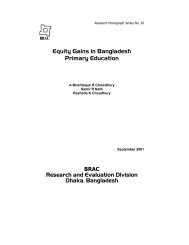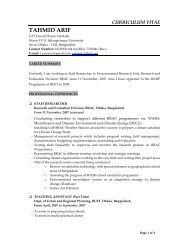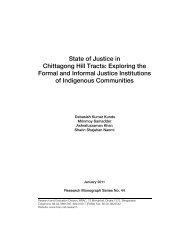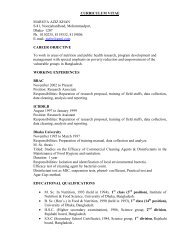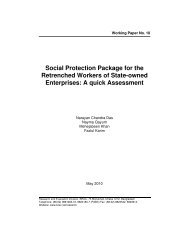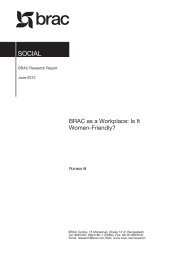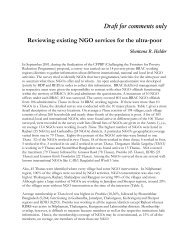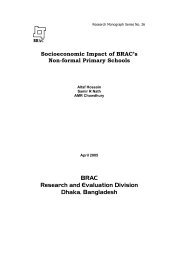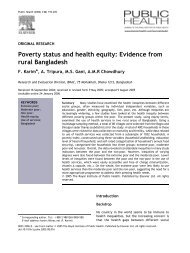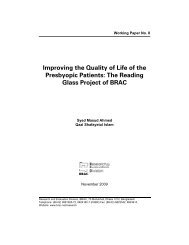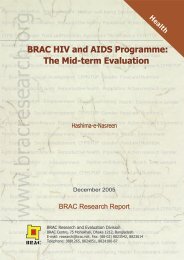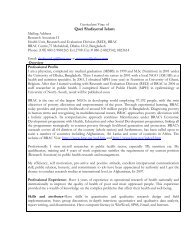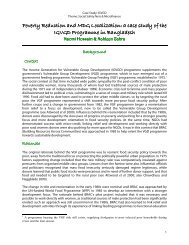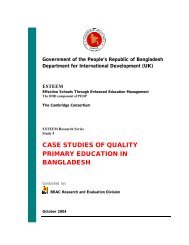Combining health and social protection measures to reach the ultra ...
Combining health and social protection measures to reach the ultra ...
Combining health and social protection measures to reach the ultra ...
You also want an ePaper? Increase the reach of your titles
YUMPU automatically turns print PDFs into web optimized ePapers that Google loves.
Introduction<br />
Research contributions <strong>to</strong><br />
improving equitable access <strong>to</strong><br />
<strong>health</strong> in developing countries<br />
Article by Stephen A Matlin<br />
Everywhere in <strong>the</strong> world, issues of equitable access are<br />
fundamental <strong>to</strong> improving <strong>the</strong> <strong>health</strong> of all <strong>the</strong> people 1 .<br />
Limitations of access <strong>to</strong> information, <strong>to</strong> services for<br />
prevention <strong>and</strong> treatment, or <strong>to</strong> good quality <strong>health</strong>-related<br />
products are among <strong>the</strong> many fac<strong>to</strong>rs that create gradients in<br />
<strong>health</strong> status within <strong>and</strong> between societies.<br />
High levels of malnutrition, maternal <strong>and</strong> child mortality<br />
<strong>and</strong> infections with HIV/AIDS, TB, malaria <strong>and</strong> a number of<br />
pathogenic tropical parasites in some developing countries<br />
have attracted much attention <strong>and</strong> led <strong>to</strong> <strong>the</strong> establishment of<br />
<strong>the</strong> Millennium Development Goals 2 <strong>to</strong> reduce some of <strong>the</strong><br />
starkest <strong>health</strong> gradients between countries. But <strong>the</strong>se do not<br />
address <strong>the</strong> broader <strong>health</strong> conditions that affect people<br />
throughout <strong>the</strong> world, including a host of noncommunicable<br />
diseases that are becoming increasingly prevalent in low- <strong>and</strong><br />
middle-income countries 3 , nor <strong>the</strong> wide range of fac<strong>to</strong>rs <strong>and</strong><br />
determinants that act as pre-conditions for people <strong>to</strong> achieve<br />
<strong>and</strong> maintain good <strong>health</strong>.<br />
His<strong>to</strong>rically, some groups have experienced long-st<strong>and</strong>ing<br />
discrimination in access <strong>to</strong> <strong>health</strong> including, among o<strong>the</strong>rs:<br />
women, people with disabilities, indigenous peoples, poor<br />
people, people in low-income countries, rural populations,<br />
slum dwellers, elderly people, children, adolescent <strong>and</strong> young<br />
people, people of low <strong>social</strong> class or caste <strong>and</strong> people<br />
stigmatized by specific conditions such as HIV/AIDS.<br />
Given <strong>the</strong> wide range of <strong>health</strong> determinants <strong>and</strong><br />
conditions that are at play, <strong>the</strong> spectrum of research required<br />
<strong>to</strong> address <strong>the</strong> complex range of fac<strong>to</strong>rs associated with<br />
inequities in access is necessarily very broad. Research can<br />
help <strong>to</strong> identify <strong>and</strong> address barriers <strong>to</strong> access of all types<br />
(including economic, geographical, institutional, political,<br />
socio-cultural <strong>and</strong> technological barriers) <strong>and</strong> can help <strong>to</strong><br />
identify, test <strong>and</strong> validate <strong>measures</strong> <strong>to</strong> improve equity of<br />
access for all. The range of people who need <strong>to</strong> be engaged<br />
Given <strong>the</strong> wide range of <strong>health</strong> determinants <strong>and</strong><br />
conditions that are at play, <strong>the</strong> spectrum of research<br />
required <strong>to</strong> address <strong>the</strong> complex range of fac<strong>to</strong>rs<br />
associated with inequities in access is necessarily<br />
very broad<br />
in such research is also extensive – encompassing not just<br />
physical, biological, <strong>social</strong> <strong>and</strong> behavioural scientists located<br />
in academic research institutions but also <strong>health</strong> workers,<br />
nongovernmental organizations (NGOs), communities, civil<br />
society groups <strong>and</strong> individuals, including representatives of<br />
groups on whom <strong>the</strong> research is focused.<br />
This article considers a diverse array of fac<strong>to</strong>rs associated<br />
with inequities in access <strong>to</strong> <strong>the</strong> means <strong>to</strong> achieve better<br />
<strong>health</strong> in developing countries <strong>and</strong> summarizes some of <strong>the</strong><br />
ways in which research is, or could be, playing a role in<br />
removing barriers <strong>and</strong> biases.<br />
Access <strong>to</strong> <strong>the</strong> preconditions for <strong>health</strong><br />
It is increasingly appreciated 4 that a broad array of nonbiological<br />
fac<strong>to</strong>rs act as determinants of <strong>health</strong>, including<br />
those of economic, environmental, political <strong>and</strong> <strong>social</strong> origins<br />
(Figure 1). Improving <strong>health</strong>, especially for some of <strong>the</strong><br />
poorest <strong>and</strong> most marginalized in society, will require giving<br />
much greater attention <strong>to</strong> <strong>the</strong>se “causes of <strong>the</strong> causes” of ill<strong>health</strong>,<br />
with effort needing <strong>to</strong> be concentrated on securing <strong>the</strong><br />
human rights on which many of <strong>the</strong>se determinants depend.<br />
Research <strong>to</strong> examine <strong>the</strong>se wider determinants of <strong>health</strong>, <strong>to</strong><br />
underst<strong>and</strong> <strong>the</strong> causal relationships <strong>and</strong> <strong>to</strong> demonstrate ways<br />
in which <strong>the</strong>y can be used <strong>to</strong> improve <strong>health</strong> status <strong>and</strong><br />
<strong>health</strong> equity is scarce <strong>and</strong> <strong>the</strong>re is a need <strong>to</strong> begin by<br />
establishing <strong>the</strong> scope of <strong>the</strong> research agenda, mapping <strong>the</strong><br />
human <strong>and</strong> financial resources already available <strong>and</strong> setting<br />
priorities for where <strong>and</strong> how <strong>the</strong> most urgent gaps are <strong>to</strong> be<br />
filled. The research agenda on determinants of <strong>health</strong> must<br />
include studies of <strong>the</strong> extent <strong>to</strong> which human rights are<br />
recognized <strong>and</strong> upheld, given that <strong>health</strong> <strong>and</strong> human rights<br />
are inextricably connected.<br />
Among <strong>the</strong> broad range of determinants, <strong>social</strong> fac<strong>to</strong>rs have<br />
received most attention recently, particularly through <strong>the</strong><br />
establishment of a series of Knowledge Networks by <strong>the</strong> WHO<br />
Commission on Social Determinants of Health (CSDH) 5 . The<br />
CSDH, created in 2005 <strong>to</strong> draw attention <strong>to</strong> pragmatic ways<br />
of creating better <strong>social</strong> conditions for <strong>health</strong>, aims <strong>to</strong> promote<br />
models <strong>and</strong> practices that effectively address underlying<br />
<strong>social</strong> inequities, human rights <strong>and</strong> <strong>the</strong> broad <strong>social</strong><br />
determinants of <strong>health</strong>; <strong>to</strong> support countries in placing <strong>health</strong><br />
as a shared goal <strong>to</strong> which many government departments <strong>and</strong><br />
sec<strong>to</strong>rs of society contribute; <strong>and</strong> <strong>to</strong> help build a sustainable<br />
Global Forum Update on Research for Health Volume 4 ✜ 011



